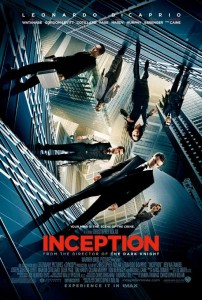I saw Inception three weekends ago and, for the most part, it rocked. In fact, I mentioned on a comment board that Inception “(intellectually) rocked.”
It got me thinking, and I’m not talking about the multiple layers of what was a dream and what was real in the movie. It got me thinking about the oft-debated role of entertainment in the world today, of the power of pop culture and the supposed responsibility it has towards the viewing public at large. Should it be a purely-entertaining spectacle, a visual and narrative means to appeal to the “lowest common denominator” (a phrase which I loathe to the core, in that it belittles the worth of the average person – to the point that they lash out into, oh, let’s say, Tea Partier-like mentalities)? Or should it be a thought-provocative, challenging piece of work that really forces its audience to ponder the world around them?
After hits like Inception and The Matrix, can it be both?
Short answer: of course not. Financially-speaking, it’s impossible. You need the best screenwriters, the best directors, the best action-choreographers. You need to spend time tweaking the script to have all the depths necessary to push narrative boundaries, yet maintain enough comfort food (action! explosions! hot womens!) to keep regular audience members entertained all the way through. It’s known as a high-concept film, and you can’t finance all of them at such a high level of quality. That kind of money just doesn’t exist.
Yet, even with small budgets, I would think a certain amount of intellectual-to-entertainment value could be maintained. Look, I’m all for explosions, fart jokes, gratuitous sexual scenes, and all those silly moments films and TV shows have to hook viewers. I’m a guy. But it doesn’t take a million dollars to put all of that into a framework or layer of content that seeks to say something about the world or human nature. Even if it’s nothing new or ground-breaking, a form of entertainment can really hit upon a certain truth that affects its viewers at a deeper level, even if that depth is skin deep.
Part of it is on audience members. Alan Sepinwall is partially credited for the new wave of TV criticism that focuses on close analysis of television shows, which corresponded perfectly with this “golden age of TV” that we’re apparently experiencing. There is much to be said of the kinds of great, heavy moments that TV is indeed producing, but let’s not be coy – these shows are also immensely entertaining. Breaking Bad has all the rich, wonderful elements worthy of dissecting: issues of identity, influences, family, violence, and so on. But it’s also the most entertaining, exciting, balls-to-the-walls hour on television today.
Sepinwall’s style of analysis is approachable and clean, and has been embraced by so many critics and spread across so many fields; video games and comics and music now have episodic, closer readings of their contents, as well as still maintaining their basic core. In time, cartoons of every level will begin to have something like that (outside of Pixar films), something that I’m hoping to be a part of. [Hint, hint.]
I digress. Part of the sudden fall of the indie wave in the post-Tarantino landscape was because of the number of boring indie films. These filmmakers lacked the training and experience to maintain clear pacing and exciting stories (melodramas can be exciting!), and only get caught up in their intellectual exercising. Contrast that with the vapid yawn-fest of this summer’s flock of movies – all spice, no substance. And financially, it showed.
(Note, I’m still believe there is a place for fun, silly movies like The Expendables and deep, thematic movies like There Will Be Blood. There’s always room for both types, and depending on the mood I’m willing to watch them both. However, in terms of increasing the quality to the current-television, 90s-animation, or 80s-comics level, it’s possible to do both.)
Education and critical thinking don’t have to be pretentious, maudlin, platitudinous acts. Which classes do you best remember in high school and college? The lame ones? Or the ones where your teacher or professor tried to bring life into the curriculum? It’s not that average audience members ignore smart material. It’s simply that you can’t present just the smart material. You need to jazz it up. It has to be presentable, fun, and engaging. It’s something schools should be trying, and it can’t stop once you reach the theaters.
With this new wave of TV, and the sad summer save for the hits like How to Train Your Dragon, Toy Story 3, and Inception, entertainment, even high-budget summer blockbuster, will hopefully try to be smarter, more grounded with its stories, and really seek to prefect that blend of high-octane excitement with narrative substance.



#1 by Jon on October 26, 2010 - 3:44 am
Agreed. Great post, Kevin. Would love to hear more about your plans to bring some critical analysis to all levels of cartoons. Sounds exciting!
#2 by Mike Dela Cruz on June 21, 2011 - 5:37 am
Haha! I have watched both matrix and inception but never did it cross my mind that the two movies may be connected in some ways. Very good analysis. :)